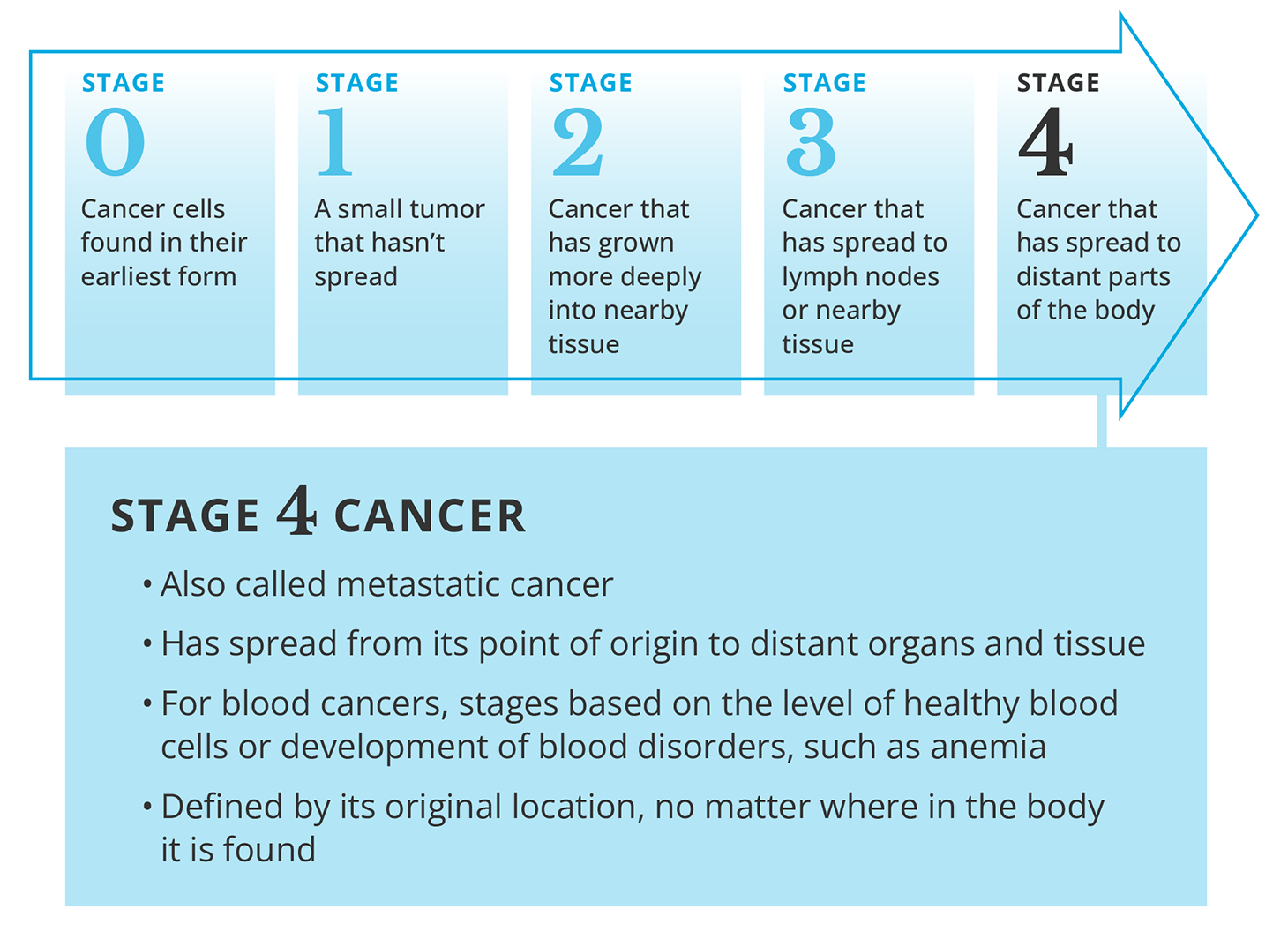Is Stage 4 Cancer Terminal? A Comprehensive Look at Prognosis and Hope

Key points
- Incurable but Treatable: This describes a condition that cannot be completely eradicated but can be managed with ongoing therapy. The goals of treatment are to control the disease, slow its progression, shrink tumors, and extend survival while maintaining a good quality of life. Many Stage 4 cancers now fall into this category.
- Terminal: A disease is considered terminal when it no longer responds to curative or life-extending treatments. At this point, the focus of medical care shifts from controlling the cancer to providing comfort, known as palliative or end-of-life care.
A diagnosis of Stage 4 cancer is a life-altering event, filled with uncertainty and fear. The first question that often comes to mind is a heavy one: "Is it terminal?" While Stage 4 represents the most advanced phase of the disease, the answer is no longer a simple "yes." Thanks to remarkable medical advancements, the landscape is shifting from a universally terminal prognosis to one where many advanced cancers can be treated and managed as chronic illnesses, extending both the length and quality of life.
This article will provide a comprehensive, expert-backed look into what a Stage 4 diagnosis means today, moving beyond the statistics to explore the realities of treatment, the importance of personalized care, and the very real reasons for hope.
Understanding the Terminology: Stage 4 vs. Terminal Cancer
To understand the prognosis, it's crucial to first clarify the terms. The language used by medical professionals carries significant weight, and the difference between "Stage 4" and "terminal" is a critical one.
What Does Stage 4 Cancer Mean?
Stage 4 cancer, also known as metastatic cancer, means the cancer has spread (metastasized) from its original location to distant parts of the body. Cancer cells can break away from the primary tumor and travel through the bloodstream or lymphatic system to form new tumors in organs like the liver, lungs, bones, or brain.
 Source: Cancer Treatment Centers of America
Source: Cancer Treatment Centers of America
The stage of a cancer helps doctors determine the extent of the disease and plan the best course of treatment. It does not, however, automatically define the outcome.
The Critical Distinction: "Incurable but Treatable" vs. "Terminal"
While the terms are often used interchangeably in conversation, they have distinct medical meanings:
- Incurable but Treatable: This describes a condition that cannot be completely eradicated but can be managed with ongoing therapy. The goals of treatment are to control the disease, slow its progression, shrink tumors, and extend survival while maintaining a good quality of life. Many Stage 4 cancers now fall into this category.
- Terminal: A disease is considered terminal when it no longer responds to curative or life-extending treatments. At this point, the focus of medical care shifts from controlling the cancer to providing comfort, known as palliative or end-of-life care.
The psychological impact of this distinction is profound. Hearing "incurable but treatable" can instill a sense of hope and agency, empowering patients to participate actively in a long-term care plan.
Why a Stage 4 Diagnosis Is Not a Monolith: Factors That Shape Your Prognosis
No two cancer cases are identical. A Stage 4 diagnosis is not a uniform sentence; the outlook is highly individual and depends on several key factors.
The Type of Cancer Matters Most
The single most significant factor in determining prognosis is the type of cancer. Survival rates for Stage 4 cancer vary dramatically from one type to another.
According to the National Cancer Institute's Surveillance, Epidemiology, and End Results (SEER) Program, 5-year relative survival rates for distant-stage cancers highlight this variance:
| Cancer Type | 5-Year Relative Survival Rate |
|---|---|
| Prostate | 34.1% |
| Breast | 31% |
| Colorectal | 15.6% |
| Lung | 8.2% |
| Stomach | 6.6% |
Source: Medical News Today, citing SEER data
It is vital to remember: These are statistics based on large groups of people diagnosed in the past. They do not predict an individual's outcome and may not reflect the impact of the very latest treatments.
Other Key Factors Influencing Outlook
Beyond the cancer type, your medical team will consider:
Patient's Age and Overall Health: Younger patients and those with fewer other health conditions generally have better outcomes.
Location of Metastases: Where the cancer has spread can impact treatment options and prognosis.
Genetic Makeup of the Cancer: Specific gene mutations in a tumor can make it vulnerable to new, highly effective targeted therapies.
Response to Treatment: How well a cancer responds to initial therapy is a significant indicator of long-term prognosis.
A New Era of Hope: How Modern Treatments Are Changing the Outlook
The narrative around Stage 4 cancer is being rewritten by groundbreaking advancements in treatment that are more precise and personalized than ever before.
The Goal of Treatment: From Cure to Control
For most Stage 4 cancers, the primary goal shifts from a complete cure to long-term control. Treatment aims to:
- Slow or stop the growth of cancer cells.
- Shrink existing tumors.
- Manage symptoms like pain or shortness of breath.
- Extend life and improve its quality.
Breakthrough Therapies Rewriting the Rules
Conventional chemotherapy is no longer the only option. The advent of novel therapies is leading to durable, long-term responses in patients who previously had few options.
- Immunotherapy: These drugs unleash the body's own immune system to find and destroy cancer cells. They have shown remarkable success in treating advanced cancers like melanoma and non-small cell lung cancer.
- Targeted Therapy: These treatments attack cancer cells with specific genetic mutations, often with fewer side effects than traditional chemotherapy.
- Advanced Surgical and Interventional Techniques: For some patients, like those with colorectal cancer that has spread only to the liver, aggressive treatments like Hepatic Artery Infusion (HAI) pumps or even liver transplants can lead to long-term survival and, in select cases, a cure.
"Not too long ago, stage 4 colorectal cancer was considered a terminal illness. But new treatment discoveries continue to improve patient outcomes and survival rates. There are many reasons to be hopeful.” - Dr. Lauren Dias, Mass General Cancer Center. Source
Stories of Resilience: Living with Stage 4 Cancer
Beyond the data are powerful stories of individuals who have defied their initial prognosis. U.S. Navy Veteran Matthew Roach, after being diagnosed with terminal stage 4 metastatic prostate cancer, underwent aggressive treatment at the Lubbock VA Clinic. A year later, his PSA levels were undetectable, and he rang a "celebration bell" he had donated to inspire others. His story is a powerful symbol of survival and the impact of dedicated care.
!Doctor and patient discussing scan results on a tablet in a modern clinic.:max_bytes(150000):strip_icc()/stage-4-cancer-5092070_color-b41add690efd427294f126c16723372c.jpg) Source: Verywell Health
Navigating the Journey: Quality of Life vs. Quantity of Life
With a focus on long-term management, a crucial conversation emerges: weighing the pursuit of a longer life against the quality of that life. This is a deeply personal negotiation.
The Personal Choice at the Heart of Treatment
Aggressive, life-prolonging treatments can come with significant side effects like nausea, fatigue, and pain. The decision to pursue a particular therapy involves a continuous dialogue between you, your family, and your healthcare team. It's essential to communicate your values, goals, and fears to ensure your treatment plan aligns with what matters most to you.
The Essential Role of Palliative and Hospice Care
It's a common misconception that palliative care is only for the end of life.
- Palliative Care (Supportive Care): Its primary goal is to improve your quality of life by managing the symptoms of cancer and the side effects of treatment. It can and should be integrated at the time of diagnosis and provided alongside treatments meant to control the cancer.
- Hospice Care: This is a specific type of palliative care for patients in their final months. The focus shifts entirely to comfort when curative or life-extending treatment is no longer an option or desired.
Frequently Asked Questions About Stage 4 Cancer
How long can you live with Stage 4 cancer? There is no single answer, as life expectancy with Stage 4 cancer varies dramatically based on the cancer type, its genetic makeup, treatment response, and the patient's overall health. While some aggressive cancers have a prognosis of months, advances in treatments mean many patients can now live for years, managing the disease as a chronic illness.
Can Stage 4 cancer be cured or go into remission? A complete cure for Stage 4 cancer is rare because the cancer has spread throughout the body. However, treatment can lead to long-term remission, where symptoms disappear and cancer becomes undetectable in tests. In these cases, the cancer is managed and controlled, but not considered permanently cured.
Is there a stage 5 cancer? Generally, no. The standard cancer staging system for most adult cancers ranges from Stage 0 to Stage 4. Stage 4 is the most advanced stage, indicating metastasis. The term 'Stage 5' is a misconception, though it is used for a specific childhood kidney cancer (Wilms tumor) to describe cases affecting both kidneys.
What are the symptoms of Stage 4 cancer? Symptoms depend on where the cancer has spread. For example:
- Bones: Bone pain, fractures.
- Brain: Headaches, seizures, dizziness.
- Lungs: Shortness of breath, persistent cough.
- Liver: Jaundice (yellowing of skin/eyes), abdominal swelling.
Conclusion: Redefining Life Beyond a Stage 4 Diagnosis
So, is Stage 4 cancer terminal? While it is the most serious and advanced stage of the disease, it is not always a terminal diagnosis. The outlook is more hopeful and nuanced than ever before. It is a serious, often incurable condition, but it is also increasingly treatable.
The journey is a highly individual one, defined by your specific cancer, your health, and your personal goals. Open, honest communication with your medical team is the most powerful tool you have. By understanding your options and defining your priorities, you can navigate the path ahead with clarity, agency, and hope.
References
- American Cancer Society
- Cancer Treatment Centers of America. (2024). What Is Stage 4 Cancer and How Is Stage Four Treated?
- Kandola, A. (2020). Is stage 4 cancer curable? Survival rates and outlook. Medical News Today.
- Mass General Brigham. (2025). Stage 4 Colorectal Cancer Treatments Offer Hope.
- National Cancer Institute (NCI)
- VA Amarillo Health Care. (2025). Symbol of Survival: Navy Veteran defies stage 4 cancer diagnosis.

About the author
Carlos Ruiz, MD, FACS, is a board-certified urologist specializing in minimally invasive and robotic surgery for urologic cancers. He is a senior partner at a large urology group in Houston, Texas, and is involved in clinical trials for new prostate cancer treatments.